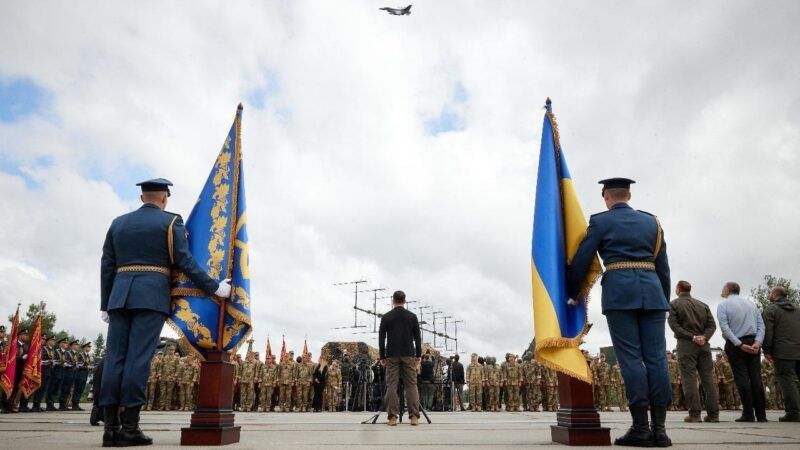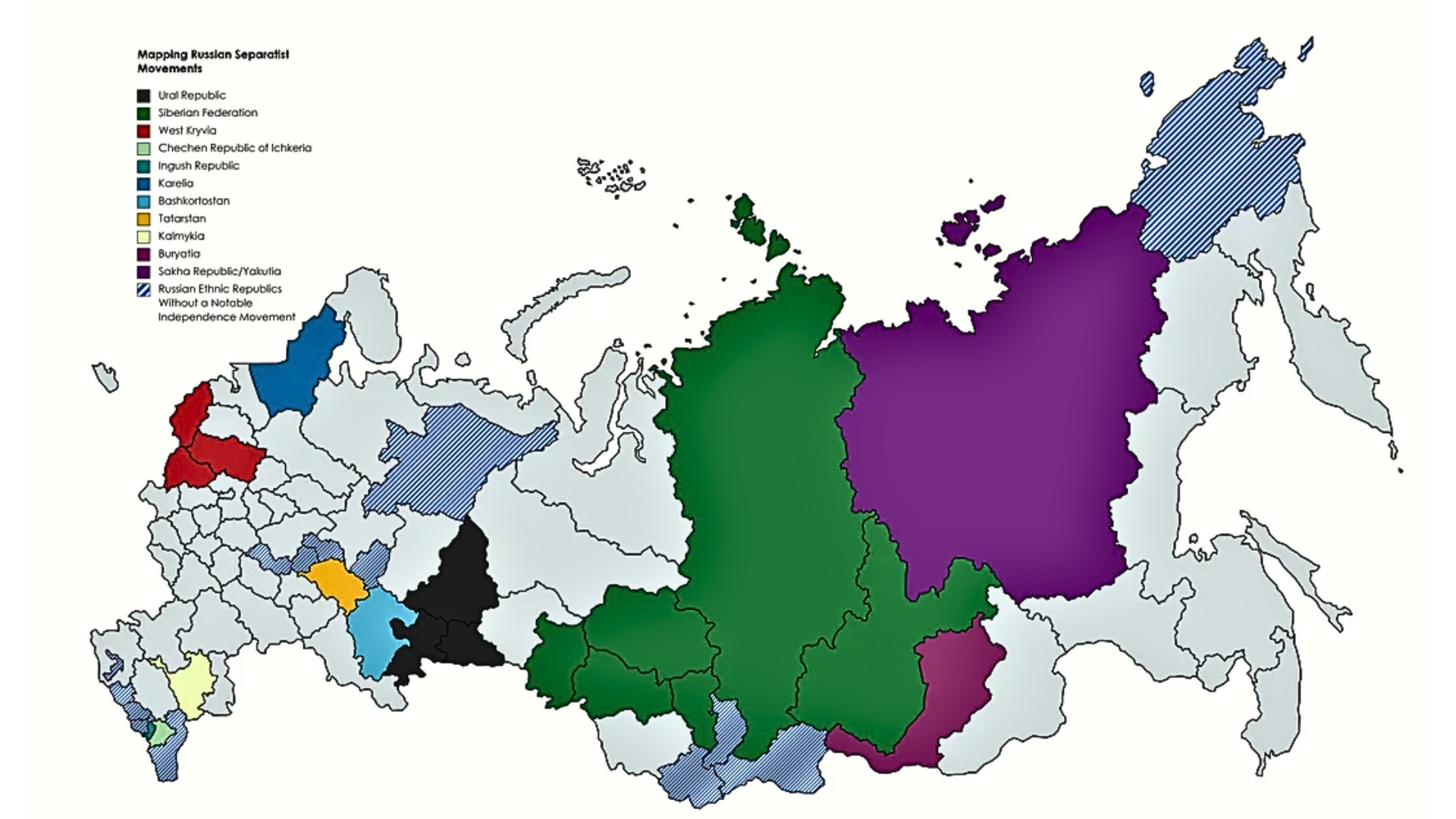Ukraine Is Safer If It Stays Out of NATO
Ukraine’s strategic advantage lies in its autonomy rather than playing into Putin's ploy.

With NATO's 75th anniversary summit concluded, it's worth taking stock of Secretary General Jens Stoltenberg's comment about an "irreversible path to NATO membership" for Ukraine. It was a bad idea two years ago for Ukraine to seek the NATO mantle for its own sake, which played directly into the Russian narrative of an external threat—a narrative critical for Russian President Vladimir Putin to maintain internal stability and his grip on power—and it's a bad idea now. Ukraine should stay out of NATO, not only because Ukraine is better off independent but also because a formal alliance will only delay Russian disintegration.
To be clear, this is not a "don't poke the Bear" argument commonly made from dismayingly pro-Kremlin quarters. Rather, the argument here is that the fastest way to see an end to the bloody Ukraine-Russia war is by absolutely crippling the Russian Bear. And the best way to do that—counterintuitive as it may seem—is not through expanding Western alliances but by supporting the significant internal discord within the Russian Federation itself. Give the Kremlin the fewest possible reasons to project a common foe and instead lend a hand to the common people of its fraying association of independence-hungry republics.
The Bear is on the attack because it is dying from cancer: in this case, a growing separatist sentiment among the diverse peoples of its vast territory, be they Karelians, Tatars, Ichkerians, or Yakuts. Talk of Ukraine joining NATO is a distraction from this important development and only goads Russia into a frenzy that postpones the internal rot.

Moreover, NATO doesn't really mean it. There is no such thing as an "irreversible path" any more than there's a predictable arc to history. Any number of things can happen that could permanently alter Ukraine's accession, not least being the eruption of hostilities between NATO and Russian forces in, say, Kaliningrad and the Suwałki Gap. Ukraine's gold-trimmed invitation would be immediately forgotten as an embarrassing excess amid the fallout from a major escalation in the Baltic. NATO nations are deeply and understandably divided over admitting a member that sits directly on the threshold of an implacable enemy engaged in active hostilities, and all talk of pathways and invitations will remain just that—talk.
In the second place, many in the West labor under the misperception that Ukraine's NATO membership would substantially alter the Kremlin's calculus. Paul Grod, writing for the Atlantic Council, believes membership would "end Russian imperial ambitions in Ukraine." Nonsense. NATO integration, while seen as some sort of Easy Button in international affairs, is no more likely to end Russian ambitions in Ukraine than Cuba joining the Warsaw Pact would have ended American interests in ending communism.
Rather than end Putin's ambitions, in fact, Ukraine's accession to NATO is Putin's ambition. By manipulating state-controlled media, Putin has masterfully promoted the myth (both at home and here in the States) that his invasion of Ukraine was a defensive move against NATO ambitions. Further talk of NATO accession merely plays into this lie.
This doesn't mean Ukraine is to be left out in the cold—quite the reverse. Ukraine has been extraordinarily effective in the conflict and can be stronger still. The entire free world (not just NATO) can supply a great deal more, and a great deal better, firepower. And Ukraine can draw on far more than its current draft demographic starting with 18- to 25-year-olds. As Grod correctly points out, "Ukraine boasts one of Europe's largest, most capable, and innovative armies." Moreover, it now possesses the world's most cutting-edge, battle-hardened, and tactically trained units, especially in the realm of drone technology and deployment. Falling under a NATO command structure is likely to degrade this world-class experience as it gets diluted amid a dithering, increasingly moribund political structure. Ukraine's defensive decisions would be filtered, for example, through NATO's risible diversity and equity initiatives or its new Center of Excellence for Climate Change and Security.
No, Ukraine, you don't need that level of distraction—NATO is increasingly dysfunctional and only likely to get more so as it grows its geographical and political footprint.
Nothing prevents motivated NATO nations from continuing to provide the kinds of weapons Ukraine needs to fend off Russia's merciless invasion. The equipment stream can continue unabated, free from the kinds of institutional restraints likely to rear their heads if Ukraine were formally admitted. In fact, if Ukraine were to accede to NATO ranks, it would likely see a decrease in these voluntary weapons deliveries, since some nations would undoubtedly view their contributions as complete—the abstract "alliance," they would inevitably come to believe, would take care of any pressing needs in Ukraine. Bureaucracies have a way of swallowing initiative.
Many sensible Ukrainians recognize these facts and are eager to maintain their defensive autonomy. Denys Yaroslavsky, a frontline brigade commander, has long argued that building a social-industrial defensive bulwark in the Israel model is a far more effective strategy—one that can be better supported, he told Reason, by bilateral treaties with "countries that understand the threat of Russian invasion." NATO membership, requiring a formal military subordination to Brussels and Washington, will only diminish the strategic and operational maneuvering space needed to hit Russia where it is most vulnerable. Can any sober-minded advocate realistically envision, for example, a NATO-sanctioned sabotage operation deep within the Russian heartland?
NATO advocacy, in short, is a bad idea—not only for Ukraine, where it will bind the country's hands in red tape, but also in the informational campaign against Russia, where it only serves to dilute the separatist internal pressures most likely to bring the Russian Bear to heel. As unappealing as it may sound, the current strategy of vigorous, coordinated free-world support is the right one. There are tens of thousands of willing, trained, and newly equipped Russian separatists currently fighting their Russian oppressors in Ukraine. As they start their eagerly anticipated journeys home, they will be exhorting their fellow men that independence is an entirely feasible opportunity as the Bear reels from its terrible miscalculation in Ukraine.
A decisive disintegration of the Russian Federation is more probable now than ever. While deeply complex, it is hardly a recipe for disaster. Lending moral and physical support to those who wish to be free should be NATO's focus, not idle and counterproductive talks over "irreversible paths" to Ukraine's alliance.


Show Comments (39)